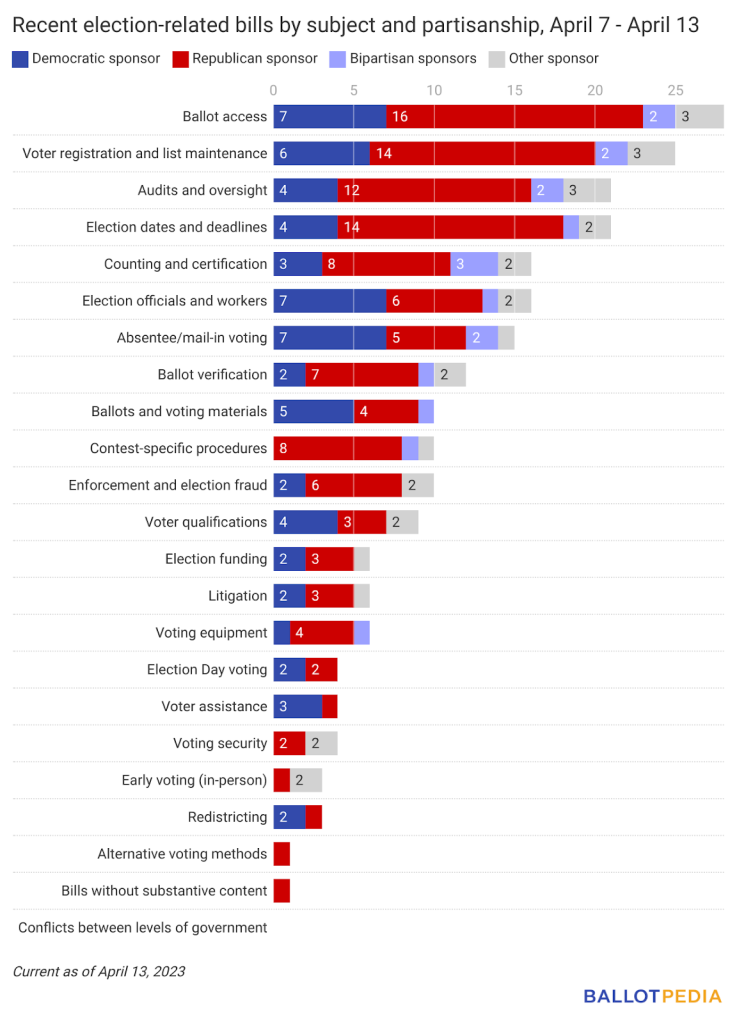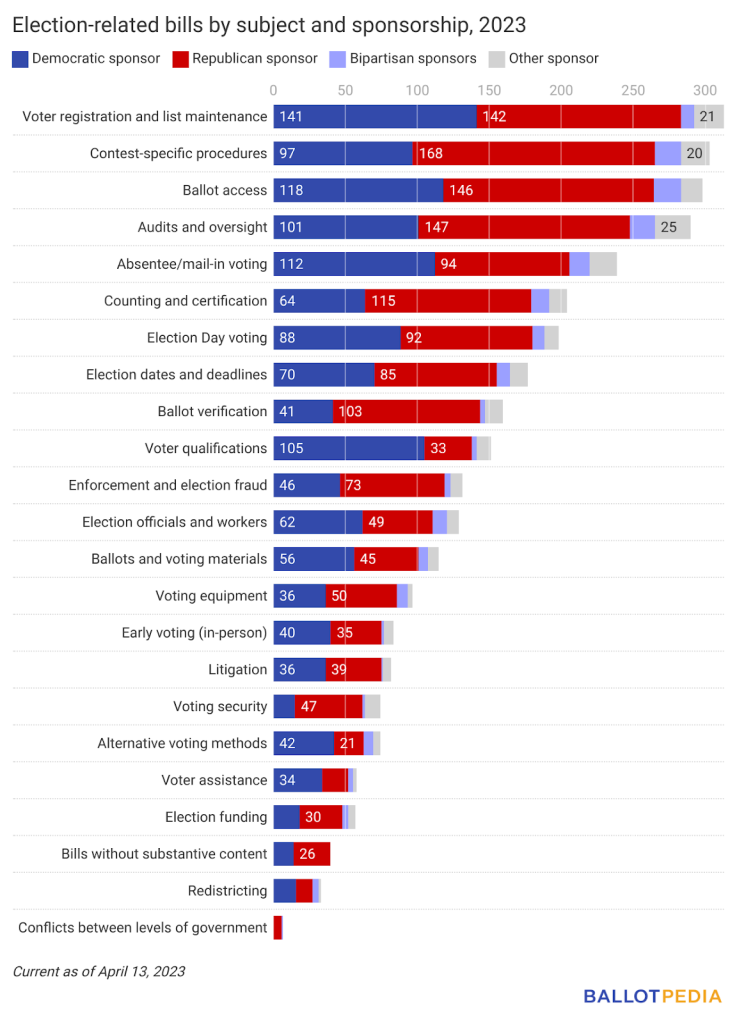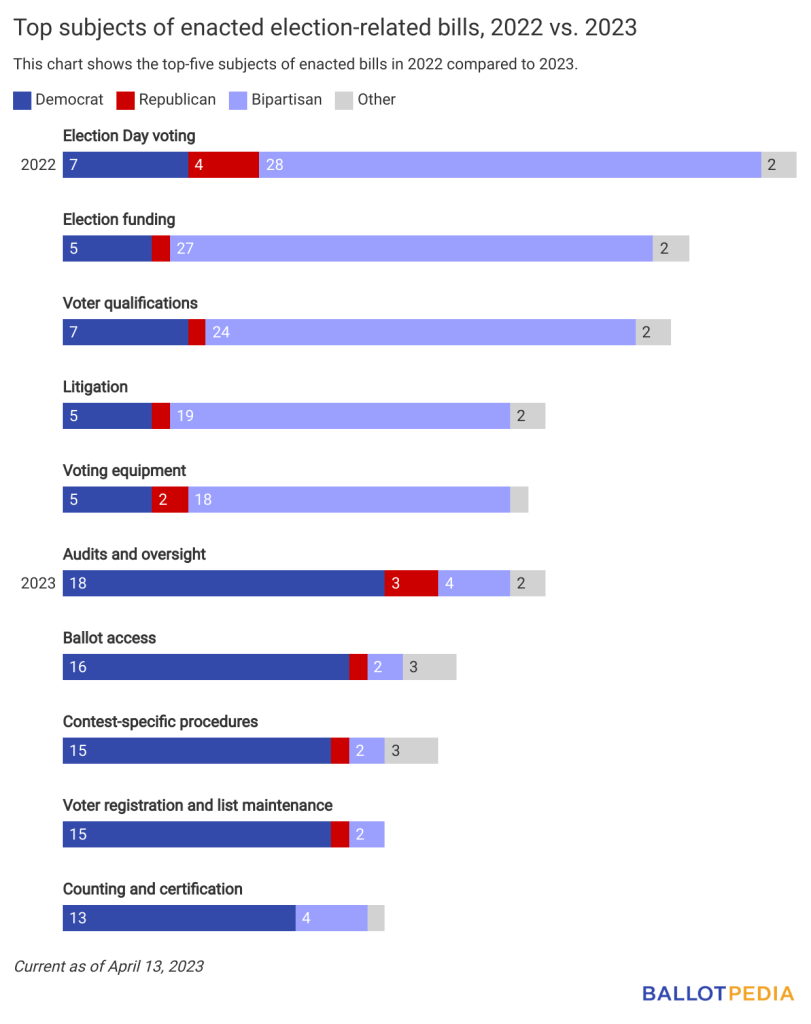
Welcome to The Ballot Bulletin: Ballotpedia’s Weekly Digest on Election Administration. Every Friday, we deliver the latest updates on election policy around the country, including legislative activity, nationwide trends, and recent news.
In today's issue, you'll find:
- Legislative activity: About the bills acted on this week and a big-picture look at all the bills we have tracked this year.
- Recent news: Noteworthy developments in election policy at the federal, state, and local levels, including litigation and ballot measures.
Legislative activity
State legislatures acted on 134 election-related bills from April 7 to April 13, down from 176 bills the previous week. Of these, 88 were introduced and 46 either passed one chamber, passed both chambers, were enacted, or were defeated.
Highlights:
- These 134 bills represent 5.6% of the 2,385 election-related bills introduced in 2023.
- At this point in 2022, 107 bills had been acted on in some way in the past week, and we were tracking 2,494 election-related bills, 4.6% more than this year.
- The bill topics with the most legislative activity this week were ballot access (24), voter registration and list maintenance (18), audits and oversight (16), counting and certification (15), and election dates and deadlines (15).
- Thirty-three (24.6%) of the 134 bills with activity this week are in Democratic trifecta states, 88 (65.7%) are in Republican trifecta states, and 13 (9.7%) are in states with divided governments. Of the 46 bills moving past the introductory stage, 13 (28.3%) are in Democratic trifecta states, 29 (63%) are in Republican trifecta states, and four (8.7%) are in states with divided governments.
- During this week in 2022, 28 (26.2%) were from states with Democratic trifectas, 27 (25.2%) were from states with Republican trifectas, and 52 (48.6%) were from states with divided governments.
- Texas legislators have introduced the most election-related bills this year. Texas holds legislative sessions in odd years only, and so had no activity in 2022. New York was the most active state at this point in 2022. South Dakota has enacted the most bills this year. In 2022, New York and California had enacted the most bills at this point.
- Of the bills enacted this year, Democrats have sponsored 12 and Republicans have sponsored 41. Of the enacted bills at this point in 2022, Democrats had sponsored 15 and Republicans had sponsored 27.
Recent activity and status changes
Of all election-related bills in state legislatures in 2023:
- 77 have been enacted (-18 from last week)
- 42 passed both chambers (+27)
- 151 passed one chamber (-23)
- 2 advanced from committee (No change)
- 2,058 have been introduced (+3)
- 51 are dead (-7)

Enacted bills
States have enacted 77 election-related bills in 2023, 58.3% of the 132 bills states had enacted at this point in 2022. To see all bills approved this year, click here.
No bills have been enacted since April 7.
Bills that passed both chambers
Forty-two bills have passed both chambers (but have not yet been enacted) in 2023. These bills represent 127.3% of the 33 bills that had passed both chambers at this point in 2022. To see all bills that have currently passed both chambers, click here.
Active bills that passed both chambers since April 7, with their official titles, are below.
Arkansas (Republican trifecta)
- AR SB272: To Create An Election Integrity Review Process; To Amend The Duties Of The State Board Of Election Commissioners; And To Amend The Law Concerning Election Law Violations.
- AR SB377: To Amend The Law Concerning Initiative Petitions; To Create A Misdemeanor Offense Concerning Initiative Petition Signatures; And To Establish The Definition Of And Regulate Paid Petition Blockers.
Indiana (Republican trifecta)
- IN HB1336: Various election law matters.
Maryland (Democratic trifecta)
- MD HB1200: Elections - Election Judges - Minimum Compensation
- MD SB863: State Administrator of Elections - Removal From Office
- MD HB410: Elections - Polling Place Plan, Prohibited Acts, and 2024 Primary Election Date
- MD HB535: Election Law - Ballot Issuance, Processing, and Reporting Procedures and 2024 Primary Date
- MD SB379: Election Law - Ballot Issuance, Processing, and Reporting Procedures and 2024 Primary Date
Montana (Republican trifecta)
- MT SB61: Clarify definition of election officials
- MT SB254: Generally revise election laws
- MT SB117: Prohibiting use of certain funds for conducting an election
- MT SB197: Revise and extend post-election audit process
Tennessee (Republican trifecta)
- TN SB0854: AN ACT to amend Tennessee Code Annotated, Title 2, Chapter 17 and Title 2, Chapter 8, relative to elections.
- TN HB1039: AN ACT to amend Tennessee Code Annotated, Section 2-3-102, relative to reviewing assignments of voters to precincts and districts.
Washington (Democratic trifecta)
- WA HB1048: Enhancing the Washington voting rights act.
Defeated bills
Fifty-one bills have been defeated in 2023. These bills represent 29% of the 176 bills that were defeated at this point in 2022. To see all bills that have been defeated in 2023, click here.
Bills defeated since April 7, with their official titles, are below.
Maine (Democratic trifecta)
- ME LD484: An Act to Prevent a Conflict of Interest in State Elections by Requiring the Secretary of State to Resign Before Running for Elected Office
Recent activity by topic and sponsorship
The chart below shows the topics of the bills state legislatures acted on since April 7. Click here to see a full list of bill categories and their definitions.

* Note: Contest-specific procedures refers to primary systems, municipal election procedures, recall elections, special election procedures, and other systems unique to a particular election type.
All 2023 bills by topic and sponsorship
The chart below shows the topics of a sample of the 2,385 bills we have tracked this year. Note that the sums of the numbers listed do not equal the total number of bills because some bills deal with multiple topics.

Enacted bills by topic and sponsorship, 2022 vs. 2023

Recent activity by state and trifecta status
Of the 134 bills state legislators acted on this week:
- 33 are in Democratic trifectas
- 88 in Republican trifectas
- 13 are in divided governments.
The map below shows election-related bills acted on in the past week by state trifecta status.

All 2023 bills by state and trifecta status
The map below shows the number of election-related bills introduced by state in 2023 by state trifecta status.

Recent news
Lawsuit challenges Virginia felon voting restrictions
A lawsuit filed in the the United States District Court for the Eastern District of Virginia on April 6 challenged Virginia Gov. Glenn Youngkin's (R) recently announced policy on how Virginians with felony records regain the right to vote. Former Gov. Bob McDonnell (R) began automatically restoring voting rights to felons upon completion of their prison sentences in 2013, and this process was continued by Govs. Terry McAuliffe (D) and Ralph Northam (D). Youngkin announced on March 22 he would instead consider individual applications for voting rights restoration after the completion of a felony sentence, including prison time, parole, and probation. The Fair Elections Center brought suit on behalf of convicted felon Gregory Williams. The plaintiffs argued that, under Youngkin's policy, officials "may grant or deny voting rights restoration applications for pretextual reasons or no reason, while secretly basing their decision on information — or informed speculation — on the applicant’s political affiliations or views." Youngkin Press Secretary Macaulay Porter said, "The process is constitutional and will be defended vigorously in court."
Arizona governor vetoes election bills
Arizona Gov. Katie Hobbs (D) vetoed four pieces of Republican-sponsored election legislation last week. Hobbs vetoed HB2477, a bill affirming the legislature's belief in the importance of the Electoral College for presidential elections, on April 5. Hobbs said, "This bill, which solely expresses a legislative opinion and does not make or change substantive policy, would be better served as a House resolution." Hobbs vetoed HB1074, HB2322, and HB2415 on April 6. HB1074 requires electronic tabulating equipment to meet certain cybersecurity standards. HB2322 establishes standards for early ballot signature verification. HB2415 would remove voters from early voting lists if they did not vote for one election cycle. Hobbs said, "The election equipment required by the bill, as well as the problem it purports to solve, does not exist." Hobbs said the signature verification standards in HB2322 should be included in the Elections Procedure Manual rather than codified into law. On HB2415, Hobbs said “Arizona’s active early voting list is secure and convenient for voters.” Rep. Alexander Kolodin (R) said Hobbs' vetoes were "hardly democratic – or sober and responsible governance." Kolodin said, "[r]ight now, Arizona has no laws setting any signature verification rules for early ballots, which help ensure that only lawful early voter’s vote. What ground could be more common making her own rules the law?"

